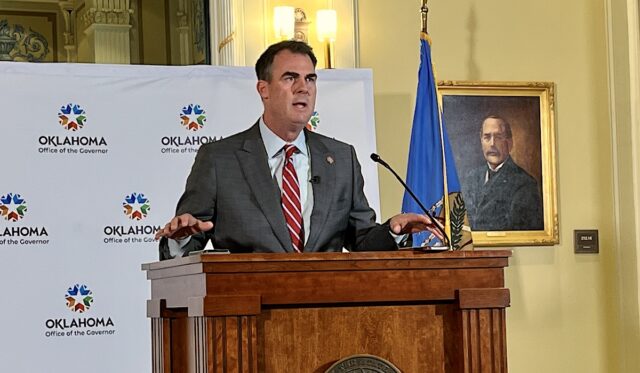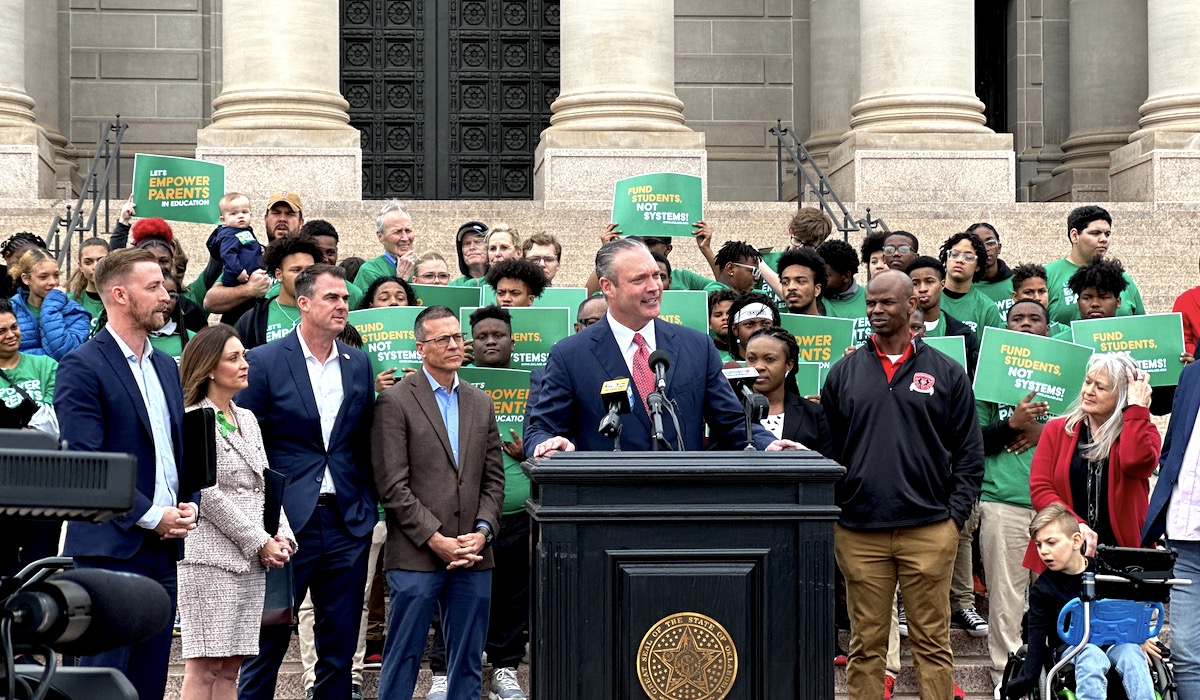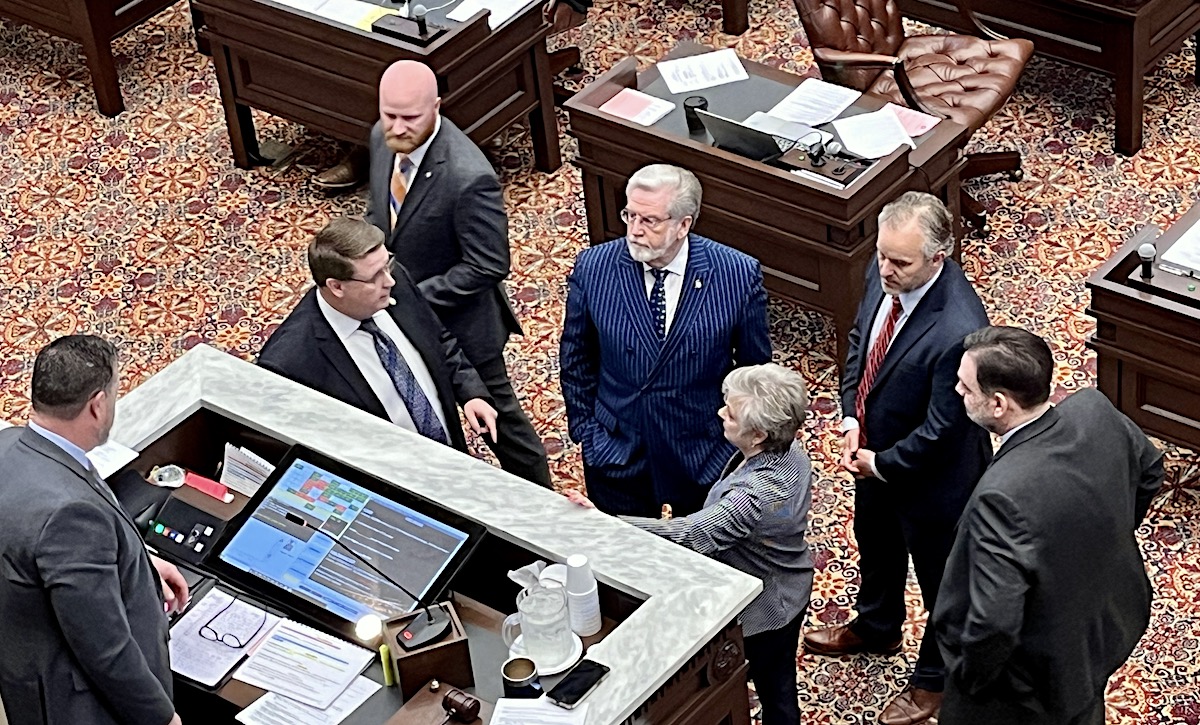
One day after Senate President Pro Tempore Greg Treat said “we may have to abandon” an education package owing to a legislative stalemate, Oklahoma Gov. Kevin Stitt outlined his proposed compromise on public education funding and school choice tax credit parameters aimed at “trying to bring both teams together” and “get something over the finish line.”
“I’ve been meeting for months with the House and Senate, and I have tried to take the best from both different bills and came up with this bill,” Stitt said during a Friday press conference. “So I’m encouraging the House and the Senate to get this across the finish line to my desk so we can move on with other matters and other people’s business here at the Capitol and finish this session strong.”
While Stitt’s proposed compromise includes a tiered teacher pay raise and tax credit tweaks more in line with the Senate’s proposal, its details regarding additional school funding fall more in line with a provision of the House’s proposal. It also proposes a phased cap on the proposed new refundable tax credits for homeschool and private school families. Overall, Stitt pitched an estimated $600 million investment in public education and a proposal for $200 million worth of the tax credits.
“Let’s not play politics,” Stitt said.
Stitt’s plan calls for $300 million to go to the “Oklahoma Student Fund” with broad leeway on how it could be spent. That component has been favored by the House, and it would cap the new funding at only $2 million per school district, regardless of enrollment.
House leaders have said that portion of their package is the only item on which they are unwilling to compromise. Senate leaders have argued that the $2 million cap would essentially bust the state funding formula to the benefit of rural districts and the detriment of urban ones.
“That is certainly an argument if you cap it at $2 million,” Stitt said in acknowledgment of the Senate’s concerns.
Stitt’s compromise also would put an additional $300 million into the state funding formula to fund a pared-down version of the tiered teacher pay raise pitched by Sen. Adam Pugh. (R-Edmond). Pugh’s proposal would have guaranteed teacher pay raises between $3,000 and $6,000 based on length of service, while Stitt’s version would include raises of $2,000 or $5,000 per teacher.
“We’re changing the amount. We lowered that a little bit,” Stitt said. “But the basic concept is the same from Sen. Pugh’s plan. It’s a sliding scale that every single teacher will get a pay raise, even if you’re already above the minimum pay scale. So if you’re a 15-year teacher, you get that $5,000 (raise).”
For the school choice tax credit bill, HB 1935, Stitt’s plan calls for a tiered entry, with an initial $5,000 tax credit refund per student who attends a private school. With a total cap of $200 million for the credit in year one, households making less than $250,000 per year would be prioritized, although the mechanism for such decisions was unclear Friday.
For the second year of that tax credit’s existence, the total amount possible for the refund would increase to $6,000 per student, with the $200 million spending cap still in place. In the tax credit’s third year under Stitt’s plan, families would get tax credit refunds up to $6,500 per private school student, with no total spending cap in place and no income prioritization limit.
“We’re going to prioritize families under $250,000, which is still a high number, and in three years there would be no cap and no limit,” Stitt said. “It allows us to step into that.”
Stitt’s plan also includes $1,000 per child tax credits for families who homeschool their children, a change from the Senate’s $1,000 per family and the House’s $2,500 per homeschool student.
Stitt said his plan is the result of “months” of negotiations with both legislative chambers.
“I think this could be the best session in state history,” Stitt said. “We can invest historic amounts in education, we can invest historic amounts in a tax credit to unlock more opportunities for parents. We can get two large, large economic development deals across the finish line.”
McCall: ‘A positive step.’ Treat: Plan has ‘issues’

House Speaker Charles McCall (R-Atoka) reacted with cautious optimism after Stitt announced his plan.
“The House is in the process of reviewing the governor’s proposed education plan and will continue discussions both internally and with our colleagues in the Senate,” McCall said in a statement. “Upon initial review, the plan looks like a positive step in the right direction for education in Oklahoma.”
Senate President Pro Tempore Greg Treat (R-OKC) seemed less enthusiastic.
“We are currently reviewing the plan the governor has proposed,” Treat said in a statement. “At first glance, it is undeniably similar to the House plan that the Senate, as well as other education groups, had issues with, which is why we amended the bills in the first place. We will take the weekend to review the governor’s plan, bring it up in our weekly Monday caucus meeting and respond in due course.”
Stitt said he is open to continuing negotiations on the plan.
“I think with good negotiation, neither side is going to be 100 percent happy,” Stitt said. “Guys, let’s break the log jam.”
Negotiations over the education plan — which originated in the House via HB 2775 (the public education investment) and HB 1935 (the school choice tax credit) — had seemed to stall in recent weeks.
McCall had tried to draw a line in the sand over his bills shortly after they advanced out of his chamber, saying that if senators amended the bills, they would effectively “kill” the legislation.
Senators amended the bills anyway, incorporating some aspects of Pugh’s education agenda, merit-based pay raises and adding an income eligibility cap for the school choice tax credits.
But McCall doubled down on his threat, and when the Senate-amended bills came back to his chamber, legislators stripped the amendments, functionally sending the bills to a conference committee made up of House and Senate members, where they await a hearing.
The bills have not been heard in the conference committee yet. In addition to Pugh and Treat, the senators included in the committee are:
- Sen. Greg McCourtney (R-Ada),
- Sen. Julie Daniels (R-Bartlesville),
- Sen. Dewayne Pemberton (R-Muskogee)
- Sen. Ally Seifried (R-Claremore), and
- Sen. Michael Brooks (D-OKC)
McCall named himself and six other House members to the conference committee:
- House Appropriations and Budget Chairman Kevin Wallace (R-Wellston),
- House Speaker Pro Tempore Kyle Hilbert (R-Depew),
- Rep. Ryan Martinez (R-Edmond),
- Rep. Jon Echols (R-OKC),
- Rep. Tammy West (R-Bethany), and
- Rep. Mark McBride (R-Moore)
Major sticking points in negotiations appear to be the tax credit income cap, the House’s Oklahoma Student Fund and the mechanism for increasing teacher pay.
Earlier this week, leading legislators seemed to be frustrated with the lack of progress in negotiations over the package and the fact that the stalemate was holding up all other budget discussions.
“Without a doubt, it’s taken the oxygen out of the room,” Treat said Thursday. “At some point, if we can’t find a pathway to success on the education thing, we may just have to abandon that and move onto the other budget things.”
One of the criticisms senators had with the House version of HB 2775 was that the Oklahoma Student Fund’s $2 million-per-district cap would make the monies appropriated outside of the state funding formula that is used to determine per-district funding.
But Wallace, the House Appropriations and Budget Committee chairman, said this week that the House sees no room to negotiate on that particular aspect, which McCall has couched as a way to ensure rural areas are not disproportionately impacted by the private school and homeschool tax credits.
“I don’t believe we’re any closer,” Wallace said Thursday. “It seems to me that the House has made many concessions and has been willing to negotiate on many parts of the education plan excluding one, which is the Oklahoma Student Fund, and it doesn’t seem like that is being reciprocated from the other chamber.”
Wallace bemoaned the overall atmosphere in the building this year.
“This is probably one of the worst sessions that I have been in,” he said. “I have not had any negotiations with my counterpart, [Senate Appropriations and Budget Chairman Roger Thompson], in the last three weeks on anything. And his statement is until we get an education deal there’s nothing really to negotiate on, and he’s not in the education meetings.”
Wallace said he did not know why Thompson, the Senate’s budget chairman, has not been in the education package negotiations. Asked Thursday, Treat said he “chose a different group of people” for the education discussions.
“Roger is integral to the team, and Roger is one of the most trustworthy senators we have out here,” Treat said. “I’ve been consulting with him on where can we go with what is the sustainable amount, but he hasn’t been — I haven’t been tying him down in those daily negotiations.”

School choice proponents praise plan
The Catholic Conference of Oklahoma — which has been a vocal proponent of school choice expansion — praised the plan Friday afternoon.
“The compromise allows Oklahoma parents to direct their tax dollars to the school that best meets their children’s educational needs and incorporates some of the best features from recent proposals. These bold efforts by state leaders will help bring quality education to all children, and its swift approval will allow Oklahoma families to benefit immediately,” said the Most Rev. Paul S. Coakley, Archbishop of Oklahoma City, and Most Rev. David Konderla, Bishop of Tulsa in a statement.
Catholic Conference of Oklahoma executive director Brett Farley attended Stitt’s press conference Friday. Afterward, he expressed optimism that the House and Senate could overcome their differences to get a plan to the governor’s desk.
“I’m optimistic that, at the end of the day, they are going to agree on this or something close,” Farley said. “They’ve talked too much about it in public to turn back now.”
A number of Catholic schools across the state have closed in recent years, Stitt and Farley said, arguing that a few could reopen if the school choice tax credit bill become’s law. Farley, who has been vocal in his support for an attempt to open a virtual Catholic charter school, listed closed Catholic schools in Guthrie, Lawton and Oklahoma City as examples.
“Over the last few years, we’ve had a number of schools close for a handful of reasons,” Farley said. “We would certainly prioritize reopening with an infusion of tuition dollars from parents who historically wanted their children to go to those schools or who never had a chance to go to them at all. (…) The possibilities are immense if we can get the chambers to agree on this and move it forward.”
Munson: ‘Plan prioritizes vouchers for private schools’
House Minority Leader Cyndi Munson (D-OKC) said her caucus remains opposed to the private school and homeschool tax credits.
“We know that Oklahomans are counting on solutions so that all families can send their children to great public schools,” Munson said. “Public dollars should go to public schools. The governor’s plan moves money away from public schools to private schools.
The Governor’s education plan prioritizes vouchers for private schools and reduces teacher pay raises and public classroom funding. House and Senate Democrats have chosen to prioritize public school students and teachers because 95 percent of Oklahomans make the choice to attend a public school.”
(Clarification: Minutes after the publication of this article, its headline was updated to modify its description of the chambers’ preferences. The article was updated again at 4:45 p.m. to correct reference to conference committee members.)





















